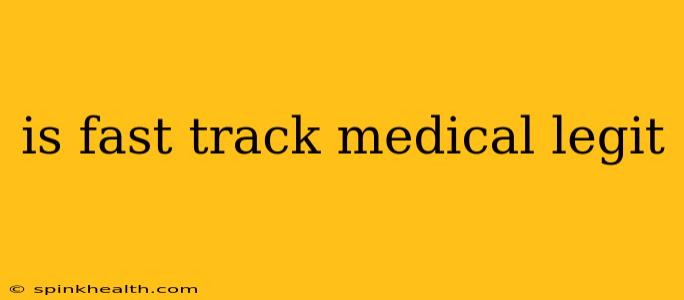Is Fast Track Medical Legit? Unraveling the Truth Behind Accelerated Medical Programs
The allure of a faster path to becoming a medical professional is undeniable. For many, the traditional medical school timeline feels daunting. This is where programs like "Fast Track Medical" enter the picture, promising accelerated pathways. But the question on everyone's mind is: Is Fast Track Medical legit? The short answer is: it depends. There's no single entity called "Fast Track Medical," but the term encompasses various programs, each with its own legitimacy and accreditation.
Let's delve deeper into this complex issue, addressing some key concerns and questions potential students often have.
What exactly are "Fast Track Medical" programs?
"Fast Track Medical" is a broad term referring to programs designed to shorten the traditional medical education timeline. These programs may take various forms:
- Accelerated Bachelor's/MD programs: These combine undergraduate pre-med requirements with medical school, allowing students to complete both in less time than the traditional route.
- Post-baccalaureate programs: Designed for students who already have a bachelor's degree but need to fulfill pre-med requirements. These programs can accelerate the process of acquiring the necessary coursework.
- Early assurance programs: Some universities offer early acceptance into their medical schools to high-achieving undergraduates, allowing them to focus their studies without the stress of a separate application process later.
The legitimacy of any "Fast Track Medical" program hinges on its accreditation and the reputation of the institutions involved.
Are accelerated medical programs accredited?
Accreditation is crucial. An accredited program ensures that the education meets certain standards of quality and rigor. Look for programs accredited by recognized regional or national accrediting bodies. This information should be readily available on the program's website. Unaccredited programs may not be recognized by medical licensing boards, jeopardizing your ability to practice medicine.
How do I verify the legitimacy of a "Fast Track Medical" program?
Due diligence is key. Don't rely solely on advertising. Take these steps:
- Check the program's accreditation: Verify accreditation through the relevant accrediting agency's website.
- Research the institution: Look into the university's or college's reputation and overall standing.
- Investigate faculty and resources: A legitimate program will have qualified faculty and adequate resources to support its students.
- Read reviews and testimonials: Look for credible reviews and testimonials from past students (though be aware that some reviews might be biased).
- Contact the program directly: Ask questions about curriculum, accreditation, and career support.
What are the potential drawbacks of accelerated medical programs?
While attractive, these programs aren't without potential downsides:
- Intense workload: Accelerated programs require a significant commitment and can lead to burnout.
- Less time for extracurriculars: The compressed timeline may leave less room for research, volunteer work, or other experiences that strengthen medical school applications.
- Higher cost: Accelerated programs might be more expensive than traditional routes.
Are there alternatives to "Fast Track Medical" programs?
Yes. Many students successfully complete their medical education through the traditional pathway. Other options include:
- Taking a gap year: This can allow you to bolster your application with research experience or volunteer work.
- Focusing on high GPA and MCAT scores: A strong academic record can significantly improve your chances of acceptance.
In conclusion: Is Fast Track Medical legit?
The legitimacy of a "Fast Track Medical" program depends entirely on the specific program and the institution offering it. Thorough research, verification of accreditation, and understanding the potential drawbacks are crucial before enrolling. Don't be swayed by flashy promises; prioritize quality and recognized accreditation to secure a legitimate path to your medical career. Remember, choosing a reputable program is paramount for success and a fulfilling medical career.

